County Board Puts Off Vote on Act 88 Tax Hike
Washtenaw County board of commissioners meeting (Sept. 19, 2012): After passing a tax increase to support services for indigent veterans, county commissioners debated and ultimately postponed action on increasing a tax for agriculture and economic development – also known as the Act 88 millage.

Veterans attending the Sept. 19, 2012 Washtenaw County board meeting saluted the American flag during the Pledge of Allegiance.
The indigent veterans tax was uncontroversial. Several Vietnam veterans attended the meeting and spoke passionately about the need to support soldiers returning from Iraq and Afghanistan. The tax was increased to 0.0286 mills, to be levied in December 2012. The current 0.025 mills brought in $344,486 in 2012. The increased millage is expected to raise $390,340 in revenues for use during 2013.
But a proposal by Conan Smith to increase the Act 88 millage generated debate, primarily related to procedural issues. On Sept. 5, commissioners had given initial approval to a tax of 0.05 mills, unchanged from the current rate. At the time, Smith raised the possibility of an increase to 0.06 mills and a change in the way the millage revenues are administered, but he made no formal amendment. The board set a Sept. 19 public hearing for the 0.05 mills, and several representatives from groups that receive revenue proceeds spoke in favor of the tax.
Later in the meeting – after the public hearing – Smith made a formal motion to amend the resolution, raising the tax rate to 0.06 mills, a 20% increase that would bring in $838,578. Ronnie Peterson objected to the process, saying that although it might be legal, but was not moral. Wes Prater said the move lacked integrity. Smith argued that the law didn’t require any public hearing at all, and that the board was going above and beyond its obligations. He pointed out that he had notified commissioners of his intent on Sept. 5, and had passed out a memo about his proposal at the Sept. 6 working session. [See Chronicle coverage: "County Tax Hike for Economic Development?"]
Ultimately, a majority of commissioners voted to postpone action on Smith’s amendment until Oct. 3, when they also voted to set a second public hearing on the 0.06 mills proposal.
Also generating considerable debate was a resolution related to animal control services. The resolution, brought forward by Barbara Bergman, directs county administrator Verna McDaniel to begin negotiations with the Humane Society of Huron Valley toward a new contract for services. It further states that if McDaniel doesn’t believe sufficient progress is being made by Oct. 30, then she’s authorized to issue a request for proposals (RFP) to seek bids from other organizations. It passed on a 10-to-1 vote, with dissent from Alicia Ping.
Much of the debate over the second resolution centered on the fact that formal recommendations from the tasks force haven’t yet been presented to the board. There were also questions over how much flexibility McDaniel will have in her negotiations. The current 2013 budget has allocated $250,000 for animal control services. This year, the county is paying $415,000 to HSHV, down from $500,000 in 2011. Commissioners expect that the final amount negotiated for 2013 will be higher than the budgeted $250,000 – and if that’s the case, the board will need to amend the budget.
Ping objected to the process, saying that it could undercut HSHV’s position if the board eventually decides to issue an RFP, because other bidders would know how much HSHV is willing to bid. She also objected to taking action without knowing the task force recommendations. “This whole process is flawed on its face,” she said.
The board took a range of other actions, including changes to an ordinance for the county’s natural areas preservation program. Commissioners eliminated a previous restriction that only 7% of millage funds could be used for management or stewardship. In addition, they approved an amendment by Conan Smith eliminating a separate requirement for allocating 75% of the millage to the acquisition and maintenance of natural areas and 25% for agricultural land. Now, allocations can be made at the discretion of the county parks and recreation commission.
Commissioners approved a variety of state grant applications and reimbursements, as well as the 2012-2013 budget for its community support & treatment services (CSTS) department. Three resolutions of appreciation were also presented during the meeting – to Rodney Stokes, former director of the Michigan Dept. of Natural Resources; Susan Sweet Scott, a long-time county employee; and the Ann Arbor alumnae chapter of Delta Sigma Theta Sorority for 50 years of service in Washtenaw County.
Agriculture/Economic Development Tax
Renewal of a tax for economic/agricultural development had been initially approved at the board’s Sept. 5 meeting. The millage is authorized under the state’s Act 88, and has been levied by the board since 2009. That year, it was levied at 0.04 mills. It was raised to 0.043 in 2010 and 0.05 in 2011. Because the Michigan statute that authorizes this millage predates the state’s Headlee Amendment, the board can levy it without a voter referendum.
The 0.05 mills would cost homeowners $5 for each $100,000 of their home’s taxable value. It was expected to raise about $693,095. The millage proceeds were to be allocated to the following local entities in 2013, with generally the same amounts that the groups received this year: Ann Arbor SPARK ($200,000), SPARK East ($50,000), the county’s dept. of community & economic development ($140, 331), Eastern Leaders Group ($100,000), promotion of heritage tourism ($65,264), Food System Economic Partnership (FSEP – $15,000), Washtenaw 4-H ($82,500), Washtenaw County 4-H Youth Show ($15,000), and MSU Extension, to support economic development in the local food system ($15,000).
On Sept. 5, it had been given initial approval by commissioners on a 7-to-3 vote, with dissent from Alicia Ping, Wes Prater, and Dan Smith. Ronnie Peterson was absent. The board also set a public hearing on the tax for Sept. 19. At the Sept. 5 meeting, board chair Conan Smith had floated the possibility of increasing the Act 88 levy to 0.06 mills. He also suggested giving the office of community and economic development (OCED) the authority for distributing the millage funds. However, he did not make a formal resolution at that point, and the board gave initial approval for the 0.05 mills.
The agenda for the Sept. 19 meeting indicated that the public hearing would be on the proposed 0.05 mills.
Agriculture/Economic Development Tax: Public Hearing/Commentary
Several people spoke about the tax during public commentary and at a special public hearing on that item. Most of the speakers represented groups that receive funding from the millage proceeds. None of the speakers mentioned specifically the amount to be levied. Here are some highlights.
Paul Krutko, CEO of Ann Arbor SPARK – the local economic development agency – told commissioners that he’d just had back surgery and it was difficult to stand. He urged the board to reauthorize Act 88, and thanked them for their previous support. He described how SPARK had leveraged the $200,000 in annual county funding, supporting $1.2 billion worth of projects over the past six years. That has generated about 11,000 jobs – so every county dollar has leveraged 109 jobs, he contended. “We think we’re a good investment,” he said, adding that his main message was to thank them.
Tom Harrison, Michigan Ladder Co.’s president and CEO, said he was a long-time member of the Eastern Leaders Group, and has used its gap financing program. [The ELG receives $100,000 in Act 88 revenues.] The Ypsilanti company is one of the oldest wooden ladder manufacturers in the nation, he said, but only recently retooled its factory to produce fiberglass ladders that are typically imported. The company was able to make that change because of the gap financing, he said. Now they’re adding jobs, and offering opportunities to people that typically encounter barriers in the workplace – people with physical or mental disabilities, or former felons. He urged the board to support the Act 88 millage.
Lynn Rich, manager of the Washtenaw Farm Council Grounds in Saline, told the board that this year marked the 57th year of the 4-H Youth Show. [The show gets $15,000 from the Act 88 millage.] It’s a week-long event that’s open to the public – about 15,000 people come through to see the animals and the things that this county’s youth can do, he said. About 625 youth participate each year, with nearly 6,000 projects. It’s a great way to get kids involved, Rich concluded, and he thanked commissioners for their support.
Todd Van Appledorn of the Center For Empowerment & Economic Development said that Act 88 support over the past three years has been instrumental to CEED’s microloan program, via the Eastern Leaders Group. They’ve made 13 new microloans – that’s $255,000 money on the street, he said, translating to 217 new jobs, though he noted that most of those were through a temporary agency. The microloans also allowed companies to retain 183 jobs, he said, adding that the program was a good thing for the county.
Tim Colbeck, executive director for the Ypsilanti Downtown Development Authority, told commissioners that the DDA board had recently passed a resolution of support for the Act 88 millage. Over the past three years, the DDA has partnered with the Eastern Leaders Group to create a building renovation fund for downtown Ypsilanti. The program has created jobs and increased property values, he said.
Ginny Trocchio, chair of the Food System Economic Partnership board, described a range of FSEP programs that are supported in part by the Act 88 revenues. [FSEP gets $15,000 from the millage.] The farm-to-school program, Tilian Farm Development Center, and other business development efforts for the local food system are all part of FSEP’s work that’s helped by the county funding. Trocchio also read a letter of support from Sharon Sheldon, an FSEP board member who also works for the county’s public health department. Sheldon highlighted the importance of work that helps bring healthier food to children, which in turn fights health problems like diabetes and obesity. Later in the meeting, Jane Bush – FSEP’s business development specialist, also spoke in support of county funding for the nonprofit.
Agriculture/Economic Development Tax: Board Discussion
When the item came up for discussion, Conan Smith proposed an amendment to replace the original resolution with a new version that increased the tax to 0.06 mills. (Some copies of the resolution that were circulated actually had 0.07 mills as the proposed amount.)
Under Smith’s amended resolution, the rate of 0.06 mills would raise about $838,578 and cost $6 for each $100,000 of a home’s taxable value. He proposed the same funding allocations as cited above, with the additional millage proceeds to be allocated this way: (1) $50,000 to the Detroit Region Aerotropolis; and (2) any remaining balance to the office of community & economic development, for activities related to those authorized by Act 88.
Ronnie Peterson immediately raised the issue that the public hearing had been held based on 0.05 mills. It was misleading to publicize one level for the millage, he said, then raise the rate after the hearing. He objected to the process, calling it a gray area that might be legal, but was not moral. He urged the board to restrain themselves from moving forward with this amendment.
Curtis Hedger, the county’s corporation counsel, confirmed that it was legal to make an amendment at this point. He noted that the Act 88 law didn’t even require a public hearing to be held. He noted that the law allows the county board to levy up to a half mill, and they were not near that amount.
Conan Smith said he understood Peterson’s concern, but that the board had gone above and beyond its obligations by holding a public hearing. He noted that he had mentioned this possible increase on Sept. 5, and pointed to an Ann Arbor Chronicle article about it. ["County Tax Hike for Economic Development?"] He reminded commissioners that he had provided the board with a written proposal on Sept. 6 at their working session. There’s been no lack of transparency, he said – he’s not sneaking through the proposal.
Leah Gunn agreed that it’s been a very open process. She pointed out that no one from the public who spoke in support of the millage had mentioned its rate. They only spoke about the benefits, she said. One thing that pleases her the most is that an increase would provide funding for the Detroit Region Aerotropolis, which in turn would free up general fund dollars that could be allocated for Barrier Busters. Barrier Busters is one of the county’s most important programs, she said, because it provides resources for people in need, who are facing eviction or can’t pay their utility bills, for example.
Wes Prater called it a matter of integrity. He understood that the board could levy this millage without a voter referendum. But they publicized the rate at one level for the public hearing, and now were proposing to increase the rate.
Dan Smith pointed out that the increase amounted to a 20% hike, and he’d be opposing it. Alicia Ping also voiced opposition, because of the increase and the way that it was being handled.
Felicia Brabec said she’d given the increase a lot of thought, and supported it because it provided extra funds for economic development.
Responding to a query from Brabec, Hedger said the board could amend the resolution or table it, and hold a second public hearing on the proposed increase. He noted that they were pushing the Nov. 7 deadline to put the millage on the December tax bills.
Yousef Rabhi supported the amendment, saying it funded important work and made the county one of the most successful in Michigan.
Dan Smith then made a motion to postpone the item until Oct. 3 and hold another public hearing at that meeting. Hedger advised separating out the two proposals, so that commissioners could vote on them individually.
Outcome on postponement: The board voted 8-3 to postpone action on the item until its Oct. 3 meeting. Voting against postponement were Conan Smith, Leah Gunn and Rolland Sizemore Jr.
Conan Smith said he opposed a second public hearing. He felt they had already gone above and beyond the law, and that the people who supported a second hearing were already opposed to the increase. He called it a ”fabulous delaying tactic.”
Barbara Bergman cautioned Smith not to assume he knew how she would vote, or ”you’ll be in for big surprise.”
Outcome on public hearing: The board voted 7-4 to hold another public hearing on Oct. 3 about the possible increase to 0.06 mills. Voting against a hearing were Conan Smith, Dan Smith, Rob Turner and Leah Gunn.
Tax Increase for Indigent Veterans
A small tax increase for services to support indigent veterans was on the Sept. 19 agenda for final approval. The Michigan statute that authorizes this millage predates the state’s Headlee Amendment, so it can be approved by the board without a voter referendum.
The tax to support services for indigent veterans was increased to 0.0286 mills, to be levied in December 2012. The current 0.025 mills brought in $344,486 in 2012. The increased millage is expected to raise $390,340 in revenues for use during 2013.
According to a staff memo, the increase is needed because of rising claims and services from veterans due to a struggling economy, an anticipated increase in the number of returning soldiers, and a drop in property values. The county first began levying this millage in 2008. Services are administered through the county’s department of veterans affairs.
Tax Increase for Indigent Veterans: Public Hearing/Commentary
Several veterans addressed the board, all of them supportive of the tax increase and many making emotional pleas to help returning soldiers. Here are some highlights.
John Kinzinger, a Vietnam veteran, described himself as a survivor and said he’s spent about 25 years working with local veterans in Washtenaw County in various capacities. It’s veterans whose service has allowed everyone to assemble at this meeting, he said, to speak freely in public. Now, there’s a special group of veterans who’ve done very hard work in Iraq and Afghanistan, he said, and who are coming home with problems like post-traumatic stress disorder and other issues. “We’ll need to be ready for them,” he said.
The board’s resolution to increase funding for indigent veterans is very important, he said. The Washtenaw chapter of the Vietnam Veterans of America has twice been named national chapter of the year, Kinzinger noted, so they understand what’s going on with veterans. They’ve been sending out care packages to troops in Iraq and Afghanistan for 10 years, he said. When the soldiers come home, they’ll need the community’s support. We need to take care of these young people, he said, “not like after Vietnam.”
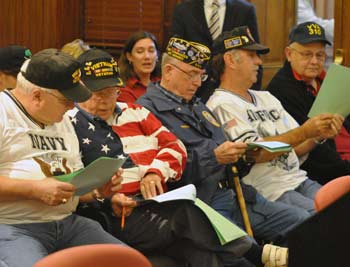
Several veterans attended the Sept. 19 meeting of the Washtenaw County board of commissioners, and spoke during public commentary and a public hearing, all of them supporting a tax for indigent veteran services.
Bob Kwiecinski, a U.S. Air Force veteran, has been active in several veterans organizations and he urged commissioners to support the tax increase. The funds provide support not only for veterans in need, but also for their widows and dependents. He gave an example of a widow who couldn’t afford the base for her husband’s memorial marker, but got funding for it from the county. There are also times when the wives and children of Michigan National Guardsmen need help while their spouses are serving overseas, he said.
Pete Belaire of Saline, another Vietnam veteran, also advocated for the millage, even though he noted jokingly that he’d be paying it himself. He keeps thinking of the people who are no longer here. All of the veterans know people who are in desperate need, he said. Belaire told commissioners that he’s been blessed – he was able to find and keep a job. “I’m standing here before you just grateful as hell to be here.” It hurts him to see young people and what they’ve gone through – they could be his kids or commissioners’ kids. A young man in Saline who used to be a sheriff’s deputy was hit by an IED – he lost his eye and seriously injured his leg. Belaire is very disappointed in how our nation has treated this man. He told the board that if this man ever needs help, “I hope to God we have the money to do it.”
Marv Rivers of Chelsea said he’s traveled around the country and is amazed at the layers of patriotism, especially in small towns. There are American flags, parades – patriotism that’s been handed down generation after generation, that you don’t see as much in larger cities. Now, “our time is passed,” said Rivers, a Vietnam veteran. It’s time to support young kids coming back from Iraq and Afghanistan. Many times they return and feel disconnected and alone, he said. Other veterans try to reach out. These young people are the nation’s best and brightest, he said. “They are our top layer of patriots.”
Tax Increase for Indigent Veterans: Board Discussion
Commissioners had asked questions at their Sept. 5 meeting, when they gave initial approval to the tax increase. Michael Smith, the department’s director, had been on hand at that meeting to respond to queries and to elaborate on the funding request.
On Sept. 19, there was no discussion on this item, though several commissioners thanked the veterans for attending the meeting. The board also moved its vote on the item to the front of the agenda, so that the veterans who attended wouldn’t have to wait through the rest of the board’s proceedings.
Outcome: Commissioners voted unanimously to increase the millage for indigent veterans services.
Animal Control Services
There was no resolution regarding animal control services on the published agenda for Sept. 19. One person spoke during public commentary, identifying herself as a 23-year volunteer with the Humane Society of Huron Valley and praising HSHV’s programs.
Toward the end of the board meeting, Barbara Bergman brought forward two resolutions on the topic.
The issue of how to handle animal control services for the county has been a contentious one, dating back to budget cuts proposed in 2011. The county currently contracts with HSHV through the end of 2012. Early this year, the board formed a policy task force and a separate work group, led by Sheriff Jerry Clayton, to analyze costs for services that HSHV now provides. For the most recent Chronicle coverage of this effort, see: “Task Force: Negotiate with Humane Society.”
Bergman’s first resolution included a list of recommendations from the policy task force. The full board had not been presented with formal recommendations, and board chair Conan Smith – who led the task force meetings – described the resolution as Bergman’s “interpretation” of those recommendations.
Bergman objected, saying she didn’t make the resolutions “out of whole cloth.” She pointed to others who had attended the most recent policy task force meeting – including Greg Dill, the county’s infrastructure management director, and administrative analyst Elaine Holleran – as well as Chronicle coverage of the meeting.
The board took a recess so that commissioners could read the resolutions. There were several discussions among commissioners during that recess, and when they reconvened, Bergman withdrew the first resolution that included the list of recommendations.
The board then considered Bergman’s second resolution:
WHEREAS, upon acceptance of the Task Force on Animal Control’s recommendations by a vote of the Washtenaw County Board of Commissioners, the County Administrator is authorized to negotiate with Huron Valley Humane Society (HVHS) to provide the services stated in the policy; and
WHEREAS, if the opinion of the Washtenaw County Administrator is that negotiations with HVHS are not moving toward the successful cost containment of up to the allocated amount specified within the 2013 County Budget by October 30, 2012, the Washtenaw County Administrator is instructed to issue a Request for Proposal (RFP) for Animal Control Services within Washtenaw County.
NOW, THEREFORE BE IT RESOLVED, if in the opinion of the Administrator by October 30, 2012, negotiations with HVHS are not moving toward the successful cost containment up to the allocated amount specified within the 2013 County Budget, excluding the cost of the Sheriff Deputies dedicated to animal control, the County Administrator is instructed to put forth a RFP to seek the services as approved by resolution of the Washtenaw County Board of Commissioners to accept the recommendations of the Task Force on Animal Control.
Leah Gunn asked for technical changes – the correct name of the organization is the Humane Society of Huron Valley (HSHV).
Alicia Ping said she felt left out. Because of her work, she hadn’t been able to attend the policy task force meetings. The board hadn’t received the recommendations of the task force, and she didn’t know how anyone could vote on this resolution without the recommendations.
Conan Smith replied that Bergman had “extracted” a promise from him to send the board a copy of draft recommendations by Sept. 26, to be considered at their Oct. 3 meeting. In that case, Ping said, why not wait until Oct. 3 to consider this resolution?
Because time is fleeting, Bergman said, and county administrator Verna McDaniel should be able to enter into negotiations sooner rather than later. Bergman noted that HSHV representatives attended the latest task force meeting, when the recommendations had been affirmed. [HSHV executive director Tanya Hilgendorf and Jenny Paillon, director of operations, had attended that meeting.] HSHV knows what the county is looking for, Bergman contended.
Ping said it might be that HSHV knows the intent of the task force, but the board hasn’t voted on those recommendations. How can McDaniel negotiate, if the board’s recommendations aren’t finalized? ”It’s like voting on the budget without the numbers,” Ping said.
Rolland Sizemore Jr. clarified with McDaniel that the amount in the 2013 budget for animal control services is $250,000. He felt that the board shouldn’t set that amount – if they do, what’s to negotiate? Sizemore was in favor of allocating $325,000 and telling HSHV to seek additional funding for the three other communities that collect fees for dog licenses: Ann Arbor, Ypsilanti and Ypsilanti Township. He also wanted to put a commissioner on the HSHV board.
Wes Prater didn’t know how commissioners could make an informed decision based on the information they had. He referred back to the resolution that the board passed at its February 2012 meeting, which called for issuing an RFP. [.pdf of Feb. 15 resolution] If they don’t do that, they’ll be violating the county’s procurement policy, he said. ”Where’s the integrity of this process? There is none,” he said. The county needs to issue an RFP based on mandated services that were outlined earlier this year in a memo from Curtis Hedger, the county’s corporation counsel, he said. [.pdf of Hedger's memo]
Dan Smith supported Bergman’s resolution, because it kept the process moving forward and provided some direction. It seems to be a contentious issue and the board is divided, he said. No final decisions are made and no budget has been determined. The resolution simply gives notice that the board wants to work with the HSHV and have an agreement by Oct. 30. A budget amendment would be brought forward with any agreement that’s proposed. If that doesn’t happen, the resolution lays out a parallel process for issuing an RFP, he said.
Dan Smith noted that all along he’s said that HSHV is his preferred provider of these services. He would like to keep these services within Washtenaw County. [Some commissioners have privately expressed the belief that the Michigan Humane Society, an organization based in Westland that is unaffiliated with HSHV, could provide services to Washtenaw County. Westland is located in Wayne County.] Smith added that he doesn’t want the county to find itself in the same position it was at the end of 2011. “This resolution helps prevent that.”
There was some discussion and disagreement about whether Bergman’s resolution limited McDaniel in her negotiations to the $250,000 set in the 2013 budget. Yousef Rabhi said it was probably confusing because in some previous language that Bergman had circulated, she had explicitly mentioned the $250,000 figure. However, the resolution she presented to the board only stated “up to the allocated amount specified within the 2013 County Budget, excluding the cost of the Sheriff Deputies dedicated to animal control…” The allocated amount that’s set in the 2013 budget is $250,000.
Ronnie Peterson asked what the board’s course of action would be if Bergman’s resolution weren’t in play. Conan Smith replied that the county would simply issue an RFP without first negotiating with HSHV.
Hedger clarified for Peterson that any amount above $250,000 would require the board to vote on an amendment to the 2013 budget. Peterson, Felicia Brabec and Rob Turner indicated that they’d be comfortable with directing McDaniel to negotiate as long as she wasn’t constrained to $250,000.
Dan Smith argued that the resolution simply gave “teeth to the timeline” for negotiations. The amount isn’t set in stone, but provides a trigger for the RFP. If McDaniel brings a proposed agreement back to the board by the Oct. 30 deadline, then the RFP isn’t issued. [The board has two meetings scheduled in October – on Oct. 3 and Oct. 17.]
Sizemore said the board knows that HSHV won’t accept $250,000. The county paid the organization $500,000 in 2012, and is paying $415,000 this year. He again asked why the three other communities that license dogs – Ann Arbor, Ypsilanti and Ypsilanti Township – weren’t being asked to contribute.
Rabhi noted that the board was very divided, and he called Bergman’s resolution a “beautiful compromise.” It gives general direction and a timeline. He then called the question.
This parliamentary move is an action to end discussion and force a vote on the item on the table. Calling the question requires a two-thirds majority – eight votes on the 11-member board – to pass. Normally, this is not an issue and calling the question is approved on a voice vote. However, in this case the outcome of a voice vote was unclear, and the clerk proceeded with a roll-call vote.
Outcome on calling the question: The motion failed on a 7-4 vote, not meeting the 8-vote majority it needed. Voting against it were Ronnie Peterson, Alicia Ping, Wes Prater and Rob Turner.
Discussion continued.
Ping called the resolution a disservice to HSHV, saying that it could undercut HSHV’s position if the board eventually decides to issue an RFP, because other bidders would know how much HSHV is willing to bid. She also objected to taking action without knowing the task force recommendations. “This whole process is flawed on its face,” she said.
Turner indicated that the resolution seemed to set a cap at $250,000. The sheriff’s work group had determined the costs for providing services are closer to $500,000. If a $250,000 cap is in place and the county can’t get other communities to kick in additional payments, then the county might as well issue the RFP right now, he said. Turner also pointed to higher costs that might be associated with an out-of-county provider, such as transportation costs.
Prater said he was bothered because the board hasn’t seen the task force recommendations. He also felt that the costs had been padded, and the services go way beyond what’s mandated by the state. Spending on animal control is excessive, he said. The county is spending money that could be used for other services, he said, pointing to the number of people in the county who don’t have health insurance as an example.
Brabec noted that at this point they can either issue the RFP or start negotiations with HSHV. It’s her expectation that McDaniel will return to the board with a budget amendment, because they know that $250,000 is insufficient. HSHV is absolutely her preferred provider, Brabec said, and this resolution simply lays out the process for proceeding.
Bergman said that the resolution doesn’t specify recommendations – the board will be able to amend the task force recommendations as it desires. Whatever the board approves is what McDaniel will use in her negotiations, Bergman said.
Peterson wondered how this resolution fit with the work of the policy task force. He noted that several commissioners had spent their summer working on this issue, as did representatives from the HSHV and the Dispute Resolution Center. He said he hoped that the Dispute Resolution Center had been compensated for its work. [Four members of the center, including executive director Belinda Dulin, facilitated the policy task force meetings. Responding to an email query from The Chronicle, McDaniel said the center would be paid an amount not to exceed $5,000. The funds would come from the county administration's professional development budget.]
Peterson said that good negotiations are difficult if there’s a cap – is there one? Conan Smith explained his understanding of Bergman’s resolution. It affirmed the budget target of $250,000, he said, but doesn’t limit McDaniel in her negotiations. The odds are that the amount will be higher than $250,000, he noted. The resolution directs McDaniel to report to the board about the direction of negotiations, Smith added, but he didn’t see any restrictions.
Peterson replied that the wording doesn’t indicate her ability to negotiate above the budgeted amount, so he just wanted to hear for the record that she did, in fact, have that flexibility. Smith stated that it’s the duty of the administrator to negotiate in good faith. If it exceeds the budgeted amount, McDaniel would need to bring that proposal to the board for approval.
At this point Prater called the question, which was unanimously approved in a voice vote.
Outcome: The resolution directing McDaniel to begin negotiations with HSHV passed on a 10-to-1 vote, with dissent from Alicia Ping.
Natural Areas Preservation Program Ordinance
An amendment to the ordinance for the county’s natural areas preservation program was on the Sept. 19 agenda for final approval. It had been given an initial OK at the board’s Sept. 5 meeting.
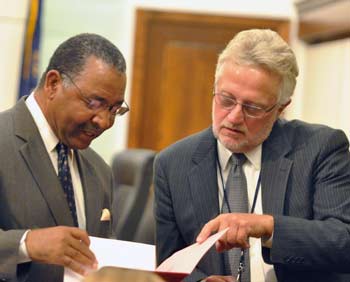
From left: Rodney Stokes, former Michigan Dept. of Natural Resources director, and Bob Tetens, director of the Washtenaw County parks & recreation department. The board presented Stokes with a resolution of appreciation during the meeting.
The change removes the previous restriction that only 7% of millage funds could be used for management or stewardship. The Washtenaw County parks and recreation commission had been briefed on the proposal at its May 8, 2012 meeting. At that time, the proposal would have raised the limit from 7% to 25%. The ordinance amendment eventually proposed to the county board eliminated all percentage restrictions on set-asides for management and stewardship.
According to a staff memo, the goal would be to use $600,000 per year for management and stewardship. Of that, roughly $240,000 would be used for ongoing stewardship activities, and $360,000 would remain to be invested in a dedicated reserve for long-term land stewardship.
By 2020, when the current millage expires, that annual investment is expected to have built a dedicated reserve of $6 million. Though no percentages were identified in the proposed amendment, $600,000 would work out to about 25% of annual millage revenues.
Voters first approved NAPP funding in 2000 and renewed it in 2010, each time for 10 ten years. The current millage – at 0.2409 mills – will expire in 2020. It generates about $3 million annually.
NAPP Ordinance: Second Amendment
At the Sept. 5 meeting, Conan Smith had floated the idea of an additional NAPP ordinance amendment – eliminating a separate requirement for allocating 75% of the millage to the acquisition and maintenance of natural areas and 25% for agricultural land. On Sept. 19 he proposed a formal amendment to that effect.
Yousef Rabhi opposed this amendment. Noting that he serves on the agricultural lands preservation advisory committee (ALPAC), which makes recommendations about farmland preservation, he felt the change would hamper their ability to make allocations and plan for the future. He didn’t think it’s a productive amendment for preserving agricultural land.
Dan Smith supported the change. He said the board could promulgate additional rules if they wanted to direct the county parks and recreation commission about how to allocate funding. [Smith is one of three county commissioners who also serve on the parks and recreation commission. The other two are Barbara Bergman and Rolland Sizemore Jr.] But he felt it was a good move to take out the percentage from the ordinance, and use some other mechanism instead to guide allocation.
Leah Gunn said she had full trust and faith in the parks and recreation commission. That group works directly with ALPAC and the natural areas technical advisory committee (NATAC), which makes recommendations about the preservation of natural areas. The three groups can all plan together, she said.
Wes Prater objected to the amendment. It’s not the current county board he’s worried about, but future boards. The 75/25 allocation allows for planning into the future, he said. It’s a reasonable approach.
Gunn countered that the parks and recreation commission already does excellent long-term planning, and that the ordinance change wouldn’t affect that. It doesn’t make sense to restrict the allocation of funding, she said. ”Let them do their job and we should stay out of it.”
Bergman asked Bob Tetens, director of the parks and recreation department, for his opinion. Tetens said he understood the arguments for and against the change. He didn’t feel that eliminating the percentages would change their approach – it would simply give them more flexibility. However, for all practical purposes, he said, the funding allocation would likely remain a roughly 75/25 split.
Prater reiterated that it’s good to give direction, and that it’s short-sighted not to plan in this way. Gunn followed by repeating her point that the parks and recreation commission and staff should be trusted to do their work.
Rabhi pointed out that the commission does a wonderful job operating under the current ordinance. Dan Smith argued that it’s not a matter of giving direction – it’s a decision about where that direction should come from. He didn’t feel the ordinance was the appropriate mechanism. Other elements of the NAPP ordinance provide ways to give additional direction, he said, if the board thinks that’s necessary.
Sizemore made an analogy: Sometimes you’ve got to let your kids make their own decisions. Sizemore said he won’t direct Tetens unless Tetens isn’t running things the way he should be, and at this point, Sizemore didn’t have any concerns about that.
Prater noted that the county board ultimately has fiduciary responsibility for parks and recreation, based on the state statute that allows counties to set up parks and recreation departments.
Conan Smith said he agreed with a lot of comments that had been made. He reminded his colleagues that they receive a copy of the parks and recreation budget each year, and if they notice something “running amok,” they can take action. He agreed with Dan Smith that the ordinance isn’t the appropriate place to provide this kind of direction, and that the parks staff needs to have the ability to be more fluid in responding to opportunities. If farmland becomes really cheap, for example, the current ordinance wouldn’t allow for more funds to be used to preserve it, he said.
Prater pointed out that the price of farmland is actually increasing.
At this point, Gunn called the question – a procedural move that forces a vote if approved by the board. Calling the question was approved on a voice vote.
Outcome on amendment eliminating 75%/25% allocation: It passed on a 9-2 vote, with dissent by Wes Prater and Yousef Rabhi.
There was no additional discussion on the amended resolution.
Outcome on ordinance change: Commissioners unanimously passed the ordinance revisions, as amended.
Land Sale to MDOT
Washtenaw County plans to sell a small strip of land along Washtenaw Avenue to the Michigan Dept. of Transportation, in a deal that was on the Sept. 19 agenda. MDOT has offered $16,500 for the land, plus an additional $2,500 for a sidewalk easement.
The land, near the county’s service center, is located at the intersection of Washtenaw and Hogback. MDOT plans to make improvements to the intersection, including the addition of right-turn lanes. The parcel contains 10,586 square feet, but 8,407 square feet of that is in the Washtenaw Avenue right of way and can’t be developed. A staff memo states that conversations with MDOT about this property have been “cordial,” but notes that the state holds the power of eminent domain and “could ultimately condemn these property interests, which would result in unnecessary attorney fees for both sides which would arise from such a legal action.”
Outcome: Without discussion, commissioners gave initial approval to the land sale. A final board vote is expected on Oct. 3.
CSTS Budget
A net gain of 1.7 full-time-equivalent (FTE) positions is part of a proposed 2012-2013 budget for Washtenaw County’s community support & treatment services (CSTS) department. The CSTS budget runs from Oct. 1 through Sept. 30, in sync with the state’s fiscal year. The county operates on a calendar year cycle.
The proposed $29,607,596 budget – an increase from the $26,838,557 budget approved for the current fiscal year – calls for eliminating 1 FTE as a result of reclassifying the job, and creating 2.7 new FTE positions. (Last year’s budget had a net loss of five FTEs, and an additional 19 FTE positions were reclassified.)
Though CSTS is a county department employing about 300 people, it receives 91.2% of its funding from the Washtenaw Community Health Organization, a partnership between the county and the University of Michigan Health System. The county provides another 1.2% of CSTS funding for services at the jail. The remaining revenue is generated by fee-for-service billing, according to a staff memo.
The WCHO is an entity that receives state and federal funding to provide services for people with serious mental illness, developmental disabilities and substance abuse disorders. At this point, WCHO “leases” its employees from the county, and contracts for services through CSTS.
CSTS Budget: Board Discussion
Commissioners asked a range of clarificational questions. Patrick Barrie, WCHO’s executive director, and other staff were on hand to answer questions.
Alicia Ping questioned the reclassification of a job – the staff child psychiatrist – which bumped an employee into a higher pay grade in the range of $150,032 to $198,288. County administrator Verna McDaniel explained that based on the employee’s qualifications, that person was being shifted into a new pay grade by reclassifying the job. It doesn’t happen often, she said. The county’s policy is to give a 4% salary increase to employees when their jobs are reclassified. For promotions, she added, the increase is 8%.
Ronnie Peterson said this policy could cause a morale problem, but it’s something the board could discuss at a later time. However, he seemed more concerned that commissioners were being asked to give the CSTS budget both initial and final approval on the same night.
Typically, agenda items are first brought to the ways & means committee, consisting of the entire board, for an initial vote. They are then forwarded to the regular board meeting for a final vote. The meetings are held back-to-back, but items from ways & means typically aren’t considered on the same night – they are forwarded to the board meeting that’s held two weeks later. The intent is to allow more time for commissioners to reflect on the items between casting their initial and final votes.
Even for pass-through funding from the state and federal levels, Peterson said, the county board is responsible to monitor and adopt those budgets. It’s not a criticism of CSTS, he added, but more about how the board and administration conduct their business.
Barbara Bergman, who serves on the WCHO board, apologized to commissioners. Originally, the item had been on the Sept. 5 agenda, she noted, but she had pulled it during that meeting because the presentation of the budget had been too confusing and needed more work. Given the need to meet other deadlines, that’s why the board is being asked to run it through initial and final approval on the same night.
Rob Turner agreed with Peterson that items needed more time to consider, but he thanked Bergman for her apology and reassurance that it wouldn’t happen again. It’s important for the board to do their due diligence, he said.
Outcome: Commissioners approved the CSTS budget on a 10-1 vote, with dissent from Dan Smith.
State Reimbursements & Grants
Several items related to state reimbursements for Washtenaw County units were on the Sept. 19 agenda for initial approval. The timing reflects the state’s fiscal year, which begins Oct. 1. In contrast, the county works on a calendar-year budget cycle; but many of its units receive significant state funding.
The Washtenaw County Trial Court juvenile division anticipates $4,329,042 in reimbursements from the state child care fund budget. Programs supported by these revenues include family foster care, institutional care and in-home care, according to a staff memo. The trial court’s Friend of the Court program is also seeking reimbursements for “services to residents who are seeking to establish paternity and/or child support orders.” Over a three-year period through Sept. 30, 2015, the county expects to receive $11,902,808 in federal revenue, administered through the Michigan Dept. of Human Services. According to a staff memo, the county currently has 18,000 active child support cases, with at least one child per case.
Also related to child welfare, the county prosecuting attorney’s office is requesting $1,102,872 in federal revenue for prosecuting and/or nonpayment of child support cases, and establishing paternity. The funds are also administered by the state Dept. of Human Services, and include a $568,147 county match over the three-year period through Sept. 30, 2015.
Commissioners also were asked to approve the application of two state grants for operations in the sheriff’s office. A secondary road patrol grant of $184,464 would fund 1.5 deputy positions, if awarded. And a $196,000 grant from the state Dept. of Treasury would cover costs for the dispatch merger between Washtenaw County and the city of Ann Arbor. That grant is part of the state’s economic vitality incentive program, which encourages intergovernmental cooperation.
Outcome: The board unanimously approved all items related to applying for reimbursements and grants.
Communications and Commendations
During the evening there were multiple opportunities for communications from the administration and commissioners, as well as public commentary. At the Sept. 19 meeting, three commendations were also presented. Here are some highlights.
Communications and Commendations: Rodney Stokes
The board passed a resolution of appreciation and gave a framed copy of it to Rodney Stokes, former director of the Michigan Dept. of Natural Resources. In July, he was appointed by Gov. Rick Snyder to lead a new “placemaking” initiative for the state’s urban areas. Conan Smith noted that Stokes has an incredible relationship with Bob Tetens, the county’s director of parks and recreation. Through their collaboration as well as the work of Tetens’ predecessor, Washtenaw County has become the jewel of Michigan, Smith said.
Tetens showed slides of some of the county and city of Ann Arbor parks & rec facilities that have been supported with DNR funding, including Rolling Hills water park, Parker Mill, and Leslie Science & Nature Center. Most recently, the county received a $2.275 million DNR trust fund grant to buy land for the Arbor Vistas Preserve natural areas connector in Ann Arbor Township.
Stokes, who received a standing ovation from the board, thanked them for the honor and said he didn’t take such recognition for granted. He gave credit to other DNR staff and the county, noting that its park system improves the quality of life for residents. He described his philosophy as a public servant, saying that whenever he can do something for someone who can’t pay him back, ”then I feel I’ve had a very good day.”
Stokes also received another resolution from the county parks and recreation commission, presented by its president, Bob Marans. The commission had passed the resolution at its Sept. 11 meeting. [.pdf of Stokes' bio and WCPARC resolution] A member of U.S. Rep. John Dingell’s staff also ready a letter of appreciation to Stokes from the congressman.
Communications and Commendations: Susan Sweet Scott
Noting that they were both retiring at the same time, commissioner Barbara Bergman read a resolution of appreciation for Susan Sweet Scott for her 23 years of service to the county. [Bergman did not seek re-election, and her term ends at the end of 2012.] Scott is currently human services manager with the joint county/city of Ann Arbor office of community and economic development. The resolution cited Scott’s expertise, leadership and tireless commitment to the residents of Washtenaw County. She received a standing ovation from the board.
In her brief remarks, Scott thanked commissioners and said it’s been a privilege to be a county employee and public servant. She was proud to call them her bosses.
Communications and Commendations: Delta Sigma Theta
Board chair Conan Smith read a resolution recognizing the Ann Arbor alumnae chapter of Delta Sigma Theta Sorority for 50 years of service in Washtenaw County. The sorority’s national website describes the organization as ”a sisterhood of more than 200,000 predominately Black college educated women …” The county resolution cited several programs sponsored by the local chapter, including the “Warm Fuzzies Blankets Project, Adopt-An-Apartment with SOS Community Services of Ypsilanti, Dr. Terri Lyn Johnson Delta Academy, Solid Gold for Education Scholarship Banquet, and the American Heart Association Walk ‘Go Red for Women.’” No one from the organization was on hand to receive the commendation.
Communications and Commendations: Thomas Partridge
Thomas Partridge spoke during one of the two opportunities for general public commentary, and at the public hearings for the Act 88 and indigent veterans millages – he supported both of those taxes, but called the amounts insufficient to meet the need for services. He also noted the importance of the Nov. 6 general election, and called on the clerks throughout the county to make an effort to expand the number of registered voters. He urged all citizens to make sure they’re registered, and to become volunteers in a countywide voter registration drive. He asked everyone to support the re-election of U.S. president Barack Obama.
Present: Barbara Bergman, Felicia Brabec, Leah Gunn, Ronnie Peterson, Alicia Ping, Wes Prater, Yousef Rabhi, Rolland Sizemore Jr., Conan Smith, Dan Smith, Rob Turner.
Next regular board meeting: Wednesday, Oct. 3, 2012 at 6:30 p.m. at the county administration building, 220 N. Main St. in Ann Arbor. The ways & means committee meets first, followed immediately by the regular board meeting. [Check Chronicle event listings to confirm date] (Though the agenda states that the regular board meeting begins at 6:45 p.m., it usually starts much later – times vary depending on what’s on the agenda.) Public commentary is held at the beginning of each meeting, and no advance sign-up is required.
The Chronicle could not survive without regular voluntary subscriptions to support our coverage of public bodies like the Washtenaw County board of commissioners. Click this link for details: Subscribe to The Chronicle. And if you’re already supporting us, please encourage your friends, neighbors and colleagues to help support The Chronicle, too!




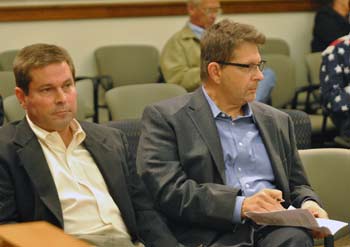
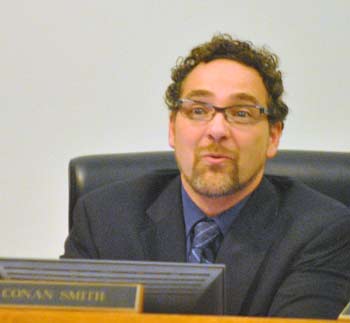
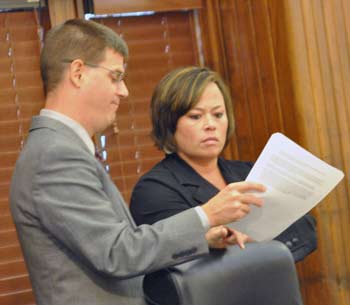
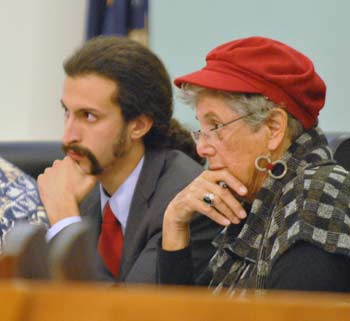
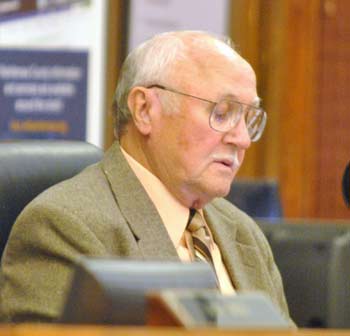

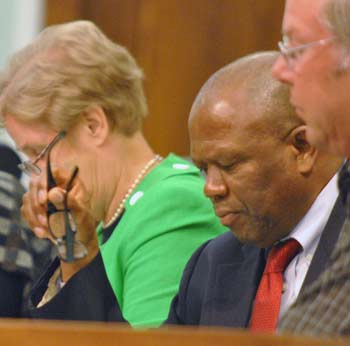
Conan Smith, the Democratic County Commissioner representing SPARK.
I would really like to see the details on how SPARK has “generated” 11,000 jobs. Which jobs specifically?
And I’d like to know how they turned $200K into $1.2 billion. “I’ll have what HE’S having.”
He described how SPARK had leveraged the $200,000 in annual county funding, supporting $1.2 billion worth of projects over the past six years. That has generated about 11,000 jobs – so every county dollar has leveraged 109 jobs, he contended.
Yeah wait, let’s do the math there. If every dollar of $200,000 has “leveraged” 109 jobs, that’s… 21,800,000 jobs “leveraged.”* Or maybe he means “every job has cost $18.18″ in “leverage.”
I’m sure there are facts somewhere at the bottom of this pile of BS, but, as with all things SPARK, we’ll never know because of its complete lack of transparency.
*Unless he is using the $1.2 billion figure, in which case we’re talking $130.8 billion jobs, which would explain why we had to build another parking lot, at least.
Rod,
Earlier this year, when the Ann Arbor city council approved its annual $75,000 general fund allocation to SPARK, Skip Simms offered some numbers, specific to Ann Arbor (as contrasted with Smith’s figures, which are likely to include all of SPARK’s activity in Washtenaw County) that are somewhat more modest [from the June 18, 2012 meeting]:
Thanks, Dave. Those numbers still seem to entail a very generous interpretation of “jobs created.” But I’m no expert (to state the obvious); it would be good for SPARK to release the data behind those claims so there could be some objective analysis.